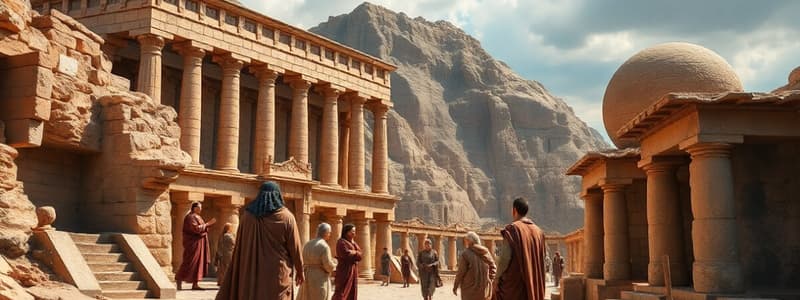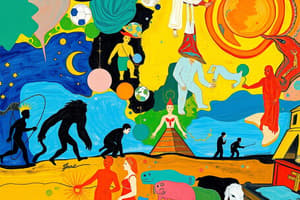Podcast
Questions and Answers
Who is credited with inventing the World Wide Web?
Who is credited with inventing the World Wide Web?
- Nicolaus Copernicus
- Tim Berners-Lee (correct)
- Claudius Ptolemaus
- Socrates
What is the primary emphasis of Confucianism?
What is the primary emphasis of Confucianism?
- Technological advancement
- Individual rights and freedoms
- Religious superiority
- Harmony with nature and social order (correct)
Which ancient civilization is known for the Great Wall of China?
Which ancient civilization is known for the Great Wall of China?
- Chinese (correct)
- Egyptians
- Sumerians
- Babylonians
What model did Claudius Ptolemaus propose?
What model did Claudius Ptolemaus propose?
What did Nicolaus Copernicus believe about the center of the universe?
What did Nicolaus Copernicus believe about the center of the universe?
What was a significant outcome of the ideas generated during the period of Socrates?
What was a significant outcome of the ideas generated during the period of Socrates?
What is the Sumerian writing system known as?
What is the Sumerian writing system known as?
What characterized the Spanish Colonial Period in the Philippines?
What characterized the Spanish Colonial Period in the Philippines?
What was the main focus of Sigmund Freud's work?
What was the main focus of Sigmund Freud's work?
What significant publication is attributed to Copernicus?
What significant publication is attributed to Copernicus?
Which of the following was NOT a method used by pre-colonial people for technology and resources?
Which of the following was NOT a method used by pre-colonial people for technology and resources?
Which concept did Charles Darwin significantly change in scientific thought?
Which concept did Charles Darwin significantly change in scientific thought?
How did humans in pre-colonial times keep track of years?
How did humans in pre-colonial times keep track of years?
What is the significance of the invention of the printing press by Johannes Gutenberg?
What is the significance of the invention of the printing press by Johannes Gutenberg?
Which river system is often referred to as the 'Cradle of Civilization'?
Which river system is often referred to as the 'Cradle of Civilization'?
What types of trade did sophisticated designs in the Metal Age facilitate?
What types of trade did sophisticated designs in the Metal Age facilitate?
Which of the following best describes the term 'Scientific Revolution'?
Which of the following best describes the term 'Scientific Revolution'?
What was a primary purpose for which plants were used in pre-colonial societies?
What was a primary purpose for which plants were used in pre-colonial societies?
What was one of the notable activities performed by people during pre-colonial times regarding livestock?
What was one of the notable activities performed by people during pre-colonial times regarding livestock?
What was one of the main uses of the Sumerian irrigation system?
What was one of the main uses of the Sumerian irrigation system?
How did steam power contribute to society during the Industrial Revolution?
How did steam power contribute to society during the Industrial Revolution?
What does technology primarily refer to?
What does technology primarily refer to?
What is one characteristic of society mentioned in the content?
What is one characteristic of society mentioned in the content?
Which ancient civilization is known for constructing aqueducts?
Which ancient civilization is known for constructing aqueducts?
What role did religious orders play in the establishment of the colonial education system?
What role did religious orders play in the establishment of the colonial education system?
What was the purpose of sending selected Filipino students to the United States under government scholarship?
What was the purpose of sending selected Filipino students to the United States under government scholarship?
What was the primary focus of science education in the early colonial period?
What was the primary focus of science education in the early colonial period?
What significant development occurred according to the 1987 Constitution regarding science and technology?
What significant development occurred according to the 1987 Constitution regarding science and technology?
Which institution was founded in 1982 to advance science and technology in the Philippines?
Which institution was founded in 1982 to advance science and technology in the Philippines?
What types of capabilities did the state support according to the educational provisions?
What types of capabilities did the state support according to the educational provisions?
What was a significant limitation in the access to educational institutions during the colonial period?
What was a significant limitation in the access to educational institutions during the colonial period?
What type of construction was emphasized in the technology and engineering sector during the colonial period?
What type of construction was emphasized in the technology and engineering sector during the colonial period?
What was one significant impact of the Galleon Trade on the Philippines during the Spaniard colonial period?
What was one significant impact of the Galleon Trade on the Philippines during the Spaniard colonial period?
Which of the following improvements was NOT associated with the American Colonial Period in the Philippines?
Which of the following improvements was NOT associated with the American Colonial Period in the Philippines?
What was the primary aim of the AmBisyonNatin2040 vision?
What was the primary aim of the AmBisyonNatin2040 vision?
Which area received significant focus during the American Colonial Period?
Which area received significant focus during the American Colonial Period?
Which of the following was a focus of the government agencies established during the American Colonial Period?
Which of the following was a focus of the government agencies established during the American Colonial Period?
What aspect of society did the Executive Order No. 5 specifically address?
What aspect of society did the Executive Order No. 5 specifically address?
Which of the following improvements was prioritized in the focus on education during the American Colonial Period?
Which of the following improvements was prioritized in the focus on education during the American Colonial Period?
What was a major consequence of the free trade policy with the United States during the American Colonial Period?
What was a major consequence of the free trade policy with the United States during the American Colonial Period?
Flashcards
Scientific Method
Scientific Method
The systematic process of observation, experimentation, and hypothesis testing, central to modern science.
Scientific Revolution
Scientific Revolution
The period in history when major advancements in mathematics, physics, astronomy, biology, and chemistry changed how people understood the natural world.
Mesopotamia
Mesopotamia
A civilization that flourished between the Tigris and Euphrates rivers, known for its advanced irrigation systems and early forms of writing.
Society
Society
Signup and view all the flashcards
Technology
Technology
Signup and view all the flashcards
Steam Power
Steam Power
Signup and view all the flashcards
Irrigation System
Irrigation System
Signup and view all the flashcards
Aqueducts
Aqueducts
Signup and view all the flashcards
Socrates
Socrates
Signup and view all the flashcards
Socrates
Socrates
Signup and view all the flashcards
Confucianism
Confucianism
Signup and view all the flashcards
Astronomy
Astronomy
Signup and view all the flashcards
Cuneiform
Cuneiform
Signup and view all the flashcards
Ptolemaic Model
Ptolemaic Model
Signup and view all the flashcards
Copernican Model
Copernican Model
Signup and view all the flashcards
Psychoanalysis
Psychoanalysis
Signup and view all the flashcards
Copernicus's "De Revolutionibus Orbium Coelestium"
Copernicus's "De Revolutionibus Orbium Coelestium"
Signup and view all the flashcards
Heliocentric Model
Heliocentric Model
Signup and view all the flashcards
Darwin's Theory of Evolution
Darwin's Theory of Evolution
Signup and view all the flashcards
Freud's Focus on Human Sexuality
Freud's Focus on Human Sexuality
Signup and view all the flashcards
Pre-Colonial Technology
Pre-Colonial Technology
Signup and view all the flashcards
Metal Age and External Trade
Metal Age and External Trade
Signup and view all the flashcards
Spanish Colonial Period
Spanish Colonial Period
Signup and view all the flashcards
Bureau of Science's Role in Education
Bureau of Science's Role in Education
Signup and view all the flashcards
Role of Religious Orders in Early Education
Role of Religious Orders in Early Education
Signup and view all the flashcards
Focus on Religious Education
Focus on Religious Education
Signup and view all the flashcards
Introducing Formal Science and Technology
Introducing Formal Science and Technology
Signup and view all the flashcards
Pensionados Program
Pensionados Program
Signup and view all the flashcards
National Science Development Board (NSDB)
National Science Development Board (NSDB)
Signup and view all the flashcards
Department of Science and Technology (DOST)
Department of Science and Technology (DOST)
Signup and view all the flashcards
Science and Technology in the 1987 Constitution
Science and Technology in the 1987 Constitution
Signup and view all the flashcards
Galleon Trade Focus
Galleon Trade Focus
Signup and view all the flashcards
American Colonial Period
American Colonial Period
Signup and view all the flashcards
AmBisyonNatin2040
AmBisyonNatin2040
Signup and view all the flashcards
Early Focus on Agriculture and Trade
Early Focus on Agriculture and Trade
Signup and view all the flashcards
Limited Industrial Development
Limited Industrial Development
Signup and view all the flashcards
Government Agencies for Scientific Growth
Government Agencies for Scientific Growth
Signup and view all the flashcards
Study Notes
Ancient Civilizations
- Ancient Egyptians were highly religious, building temples for their leaders, and had a rich culture that included a system of pictorial writing.
- Ancient civilizations often developed near water sources for resources and trade.
- Science, technology, and society are interconnected and interdependent.
- Society is characterized by static, permanent collections of individuals.
Scientific Revolution
- This period of enlightenment saw significant advancements in mathematics, physics, astronomy, biology, and chemistry.
- These advancements transformed societal views of nature.
- The scientific revolution marked the birth of modern science.
- This period is considered a golden age for scientific thinkers and scholars.
- Scientific innovations led to a reevaluation of beliefs and ways of life.
- New research fields emerged, leading to advancements in scientific investigations, experiments, and observations.
Ancient Greek Contributions
- Greeks started Western science.
- Modern science emphasizes systematic observation, experimentation, and hypothesis testing.
Mesopotamian Civilization
- Mesopotamia was known as the cradle of civilization.
- It flourished between the Tigris and Euphrates rivers.
Communication
- Johannes Gutenberg's printing press revolutionized communication.
Steam and Industrial Revolution
- Steam power played a significant role in the industrial revolution, a new energy source.
- Technology involves methods, systems, and devices, resulting from scientific knowledge for practical purposes.
Irrigation System
- Sumerians invented irrigation, revolutionizing agriculture.
Aqueducts
- Romans were known for advanced engineering, building aqueducts.
Albert Einstein
- Albert Einstein developed the theory of relativity.
Philosophy
- Socrates is considered the father of philosophy.
- Confucianism is a Chinese philosophy emphasizing harmony with nature and social order.
- Tim Berners-Lee invented the World Wide Web.
Astronomy
- The Babylonians made significant advancements in astronomy.
- Chinese civilization demonstrated advanced engineering skills, such as the Great Wall of China.
Cuneiform
- Cuneiform was a Sumerian writing system.
Spanish Colonial Period in the Philippines
- Trade was prioritized over other economic activities during the Spanish colonial period in the Philippines, particularly through Galleon trade.
Studying That Suits You
Use AI to generate personalized quizzes and flashcards to suit your learning preferences.
Related Documents
Description
Explore the intertwined histories of ancient civilizations, including the Egyptians and Greeks, alongside the transformative period of the Scientific Revolution. This quiz delves into cultural advancements, scientific innovations, and their impact on society. Test your knowledge of how these eras shaped modern understanding.




